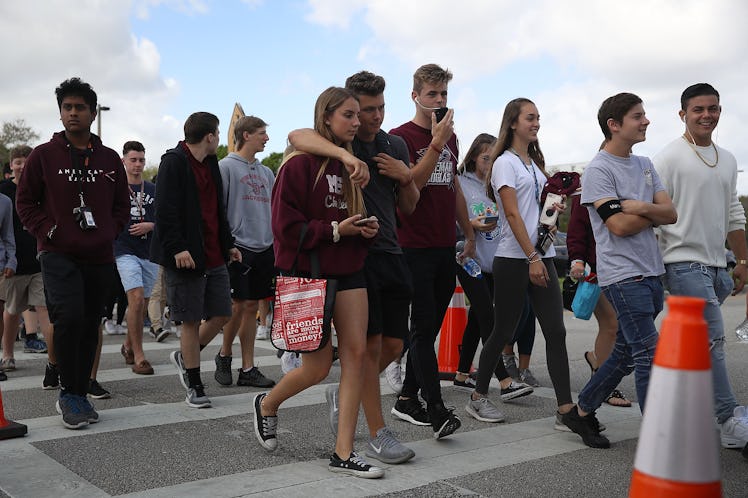
Here’s What You Should Know About Your Rights While Joining A School Walkout
On March 14, exactly one month after the Parkland school shooting that left 17 people dead, students across the nation will walk out of their schools in participation of The #Enough National School Walkout. Though the tragedy has impelled students to take action, many have wondered if that comes with consequences. So if you're interested in going, but question if you can get in trouble for walking out of school or not, here's everything you need to know.
For 17 minutes at 10 a.m. on March 14, high school teachers and students around the world will walk out of their classes to protest gun violence. Some participants will wear orange, a color used to show support of gun control, and are expected to band together to commemorate the lives of those who were killed in the Parkland tragedy. But as the event has gained momentum, so has the questions regarding whether or not students will be punished for walking out, and the answer is: it depends.
School districts are allowed to punish students for skipping class, however they are prohibited from punishing students more severely because of the political nature of a walkout. Vera Eidelman, a fellow at the American Civil Liberties Union (ACLU), told CNN that "what the school can't do is discipline students more harshly because they are walking out to express a political view or because school administrators don't support the views behind the protest."
While some schools have consented to allowing students to walk out of their classes to join the upcoming March 14 walkouts, others have announced that they would take action against those who did, citing safety precautions and class disruptions as reasons. The ACLU website says that punishments vary by state, school district, and school; but according to CNN, they typically include suspensions, the threat of unexcused absences, and grade penalties. In light of the planned protests, the organization has created a short video training on student rights, in addition to a more detailed, 30-minute video.
When it comes to private schools, though, they're not so fortunate. The ACLU's website also warns that First Amendment rights only restrict public schools, which leaves less protection over students' speech at private schools because private schools aren't controlled by the government. But the good news is that there's still a window for private school students to express themselves: social media. According to the site, schools aren't allow to punish students over the content they post to social media (as long as it's off campus), so if you can't participate in the walkout, you can at least amplify your voice online. Also, per the ACLU, schools can't punish students for action they take outside of school hours because, simply put, students "enjoy essentially the same rights to protest and speak out as anyone else."
Knowing your rights about walking out are important not only for this protest, but in the wave of protests and student actions that have been sweeping the nation. These rights are applicable for the currently planned protests across the nation, but also for upcoming ones like the March For Our Lives (though since those marches are planned for a Saturday, it's a little bit less of a risk to your permanent record).
Students have used walkout tactics for protest before. In November of last year, hundreds of students walked out of class and marched to demand that Congress take action to protect Dreamers, young undocumented immigrants who were brought to the United States as children, according to NBC News. And in the 1960s, Mexican-American students in Los Angeles walked out of school to protest racism and poor conditions in the school district, according to The Mercury News. So there's definitely a precedent of walking out of school as a form of protest.
More than 185,000 students are expected to participate in the March 14 walkout.
The #Enough National School Walkout was planned by the Women's March Youth EMPOWER as a call to action to demand stricter gun laws. So far, nearly 200,000 students have signed on to participate in the event. According to the group's event page, demands include a ban on assault weapons, and more expansive background checks, because “students and staff have the right to teach and learn in an environment free from the worry of being gunned down in their classrooms or on their way home from school."
Cate Whitman, a student who partnered with the group to plan the walkout, told Fox News she hopes the protests will shed light on the fact that gun violence affects all kinds of people. She said,
I’m hoping it will bring more focus to the larger issue of gun violence as a whole because gun violence is something that affects people from all walks of life, all over the country, and disproportionately black and brown communities. These things happen all the time in tons of communities, and I’m hoping that people start talking about it in an intersectional way.
The walkouts aren't the only protests.
In the past few weeks, students and faculty members have already taken to their communities to call for tighter gun laws, and pay their respects to the 17 students who lost their lives in the shooting. The next protest, March For Our Lives, which also denounces gun violence and has received significant support from political officials and celebrities, is scheduled for March 24. The event is held on a Saturday, so unless you have an unusual school schedule, you shouldn't have to worry about walking out of class.
I'm glad that students have taken up such a huge responsibility and are letting their voices be heard even though the odds are (seemingly) stacked against them. If you're participating in the walkout, please be safe, and keep standing up for what you believe in!